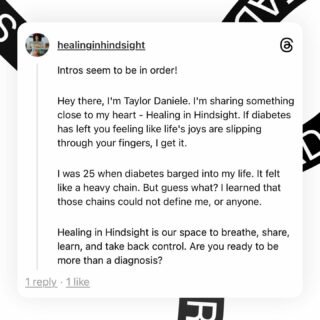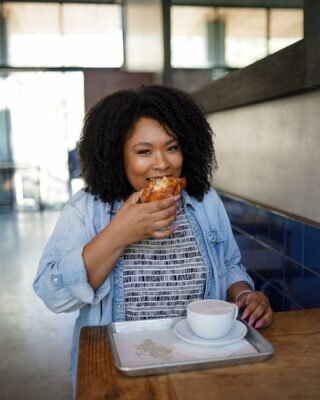Do you have diabetes? Trusting your body can be hard when you’re constantly fighting against insulin levels, blood sugar spikes, and all sorts of other issues. This can be a scary thing to deal with, but it’s important to remember that you are not alone. Millions of people around the world live with diabetes every day. In this podcast episode, we explore how to start trusting your body again- even with diabetes.
KEY POINTS
- Advocating for yourself
- Creating a system of trust
- Body Scans
Find more at www.healinginhindsight.com
Transcription for this episode is autogenerated.
Thank you to our sponsors:
CONNECT WITH THE SHOW
- Instagram @healinginhindsight
- Facebook.com/healinginhindsight
- YouTube: Healing in Hindsight™
SUPPORT THE SHOW
www.buymeacoffee.com/healinhindsight
Healing in Hindsight™ is managed by host Taylor Daniele™ and Produced by We Are 8 Studios
This podcast is for general information only. Please speak with a medical professional first before trying anything mentioned in the episode. The views expressed are the opinions of each individual. Healing In Hindsight® does not endorse the ideologies or beliefs of its guest. Please do your own research. We believe in being able to have a conversation even with differing opinions.
Transcript
Hey you, and welcome back to another episode of healing
Taylor:in hindsight, your no BS source for thriving with diabetes.
Taylor:I am Taylor, Daniele, and I want to just ask.
Taylor:I don't know if I'd call it a crazy question.
Taylor:I feel like it's a question that has come up for me a lot lately
Taylor:just in everyday interactions.
Taylor:and how I move about my routines.
Taylor:And that's basically like, how do I trust my body despite having diabetes?
Taylor:And the reason why I want to talk through this thought is.
Taylor:I've noticed in like past couple of appointments when I've had something that
Taylor:was going on with my body, that I couldn't fully explain that the answer ended
Taylor:up being it's because of my diabetes.
Taylor:And I don't quite understand if that is truly the case.
Taylor:And I got to a point where I started to feel like everything
Taylor:was because of my diabetes.
Taylor:And I've had this kind of disruptive relationship with my body in a
Taylor:sense of like, when I want things to change for the better it's held
Taylor:back because of my diabetes, or if I feel this Achor pain, I'm only
Taylor:feeling that because of my diabetes.
Taylor:And so I found myself out of sync in a way, because everything
Taylor:was tied to my diabetes.
Taylor:And so it felt like I couldn't trust the things that I was feeling.
Taylor:I couldn't Say that Hey, my shoulder hurts cause I slept wrong.
Taylor:It was more, oh, my shoulder hurts because I'm having inflammation because my blood
Taylor:sugars were too high, things like that.
Taylor:And so I've noticed just second guessing what my body is going through and
Taylor:feeling I don't know how to properly treat it or ask for the right type of.
Taylor:So I want to dive into this today because I feel like this is something that,
Taylor:many of you have also experienced, or if you live with any type of chronic
Taylor:condition or disability, that sometimes it feels like everything that's going
Taylor:on with you falls back onto that.
Taylor:So let's dive in.
Taylor:So big question and I will.
Taylor:And I don't even know if I can say admit, but I will just be honest in that.
Taylor:I don't have any answer to this immediately.
Taylor:I can only share what I've been doing in relation to this question
Taylor:of, how do we trust our bodies when we live with a chronic illness?
Taylor:And I feel like the first step that it took for me was.
Taylor:Still advocating for myself and speaking up when things
Taylor:didn't feel right or seem right.
Taylor:And even if that meant pushing back with my doctor and understanding that
Taylor:I diabetes, can't be the answer to every thing that's going on with me.
Taylor:and I feel like it started to open.
Taylor:More avenues of can we test other things?
Taylor:Yes.
Taylor:Test things that are like related to diabetes, but can we look past if I was
Taylor:a patient that didn't have diabetes, what would be your thought process on this?
Taylor:so for example, cause it's happening right now, my eye is nice and
Taylor:swollen and a little irritated.
Taylor:it did have a style.
Taylor:there was a set of lashes that I wore that even in the moment I knew I was like,
Taylor:something's going to happen with this.
Taylor:Cause it was like too close to my lash line and it was irritating
Taylor:it, so it made my eye itchy.
Taylor:And pair that with allergies and, when your eye itches,
Taylor:just unconsciously rubbing it.
Taylor:Now I do my best to keep my hands as clean as possible.
Taylor:Not perfect by any means.
Taylor:So it's got agitated, it got itchy and it got swollen.
Taylor:and so oftentimes certain ailments that come up can wind up in the diabetes
Taylor:bucket if you will, versus okay.
Taylor:The cause of a style is just irritants and a gland in your eye.
Taylor:That's basically, mildly infected.
Taylor:And it's doing what it does best to recover itself.
Taylor:it's not my first round having one and I was able to pinpoint
Taylor:the thing that agitated it.
Taylor:And of course I'll go through and make sure like things like my mascara or
Taylor:anything that touches my eyes closely are thoroughly cleaned, makeup brushes,
Taylor:and the like, but I remember, when I was looking up, What, just potentially
Taylor:what could be the cause of it?
Taylor:I do Google symptoms.
Taylor:I just don't take them with a full grain of salt because obviously some things
Taylor:come up with extremes, but having had a site before, I knew that the signs of it.
Taylor:So I still like to keep tabs on what's going on because at least
Taylor:with your eyes and diabetes, It can lead to complications.
Taylor:And I've had a friend that I ended up having to have surgery on his
Taylor:eyes because of his diabetes.
Taylor:And, it kinda just sent me into this mild panic of, okay, this
Taylor:thing is going on with my eye.
Taylor:am I going blind?
Taylor:am I, do I need to go to the hospital?
Taylor:Is this because of my blood sugars?
Taylor:checking my blood sugars to see am I in range?
Taylor:And I'm fine.
Taylor:And so I've had to start creating the system that when I have something
Taylor:that's off with my body to do a series of checks, because in order to build
Taylor:trust, I feel like there has to be continuous actions that earn that trust,
Taylor:just like you would with a person, and wanting to gain their trust as a
Taylor:friend, family member, partner, whatever.
Taylor:there are steps, right?
Taylor:And Part of that is, taking my medication on time and eating adequately
Taylor:and seeing the results of doing so through like my CGM data that by
Taylor:doing that, my body does this and that builds confidence that my body
Taylor:is going to do this when this happens.
Taylor:So when something off happens, I check, okay, are my blood sugars.
Taylor:Did I eat today?
Taylor:Am I going high?
Taylor:Am I going low?
Taylor:AMA higher.
Taylor:Am I low?
Taylor:And that way I can immediately rule out anything diabetes related because your
Taylor:body will still experience things that has nothing to do with your diabetes.
Taylor:And won't be triggered by it at all.
Taylor:Like getting a cold that's.
Taylor:Anywhere near the realm of that.
Taylor:Although, could some argue that our immune system might be a little bit lower?
Taylor:Sure.
Taylor:But not saying that's what it is.
Taylor:So building trust for me is taking a series of actions that
Taylor:builds confidence in whatever it is that you're checking against.
Taylor:And for me, what builds confidence is checking my blood sugar levels
Taylor:and seeing, okay, I'm in, if I'm in range and I'm in the green.
Taylor:And I've been eating throughout the day.
Taylor:I'm not in the green because I haven't eaten all day.
Taylor:then whatever's going on with me in this particular moment may not
Taylor:have anything to do with, diabetes.
Taylor:So it's been a journey because there have been other things
Taylor:that have come up, I was dealing.
Taylor:what mini Noah's frozen shoulder, where it's inflammation in your shoulder joint,
Taylor:so you can't move it and it's painful.
Taylor:and, because of the swelling and inflammation in that joint, you don't have
Taylor:the same type of flexibility that you did.
Taylor:And my doctor, when I went to her about it, there was a specific name for it and
Taylor:a camera, the name, and, No shade to my doctors, nurses, scientists, and all that.
Taylor:But like some of these names for things should, they're just not people friendly.
Taylor:in, in experiencing that, I, she told me it was basically diabetes related and
Taylor:that's why, and that it couldn't possibly have anything to do with anything else.
Taylor:And she gave me some medication to try to.
Taylor:The S the inflammation go down and told me that I gotta
Taylor:keep my blood sugars in check.
Taylor:cause high blood sugar can trigger inflammation.
Taylor:But something that I've always thought about is okay, well, other
Taylor:people though have inflammation.
Taylor:Other people have experienced this kind of thing.
Taylor:So is it just because of my diabetes or could it be possibly that I've been
Taylor:eating something that has been causing me to have this type of reaction?
Taylor:And so I started doing things like, once I realized that I had mild
Taylor:allergies and was starting to react to them more, having been in Austin
Taylor:so long, I started taking like a LA GRA and I don't take it every day.
Taylor:but I did start to take it, in, in high allergy seasons.
Taylor:And I did notice that my shoulder.
Taylor:exercising a little bit better.
Taylor:Now at the same time I was monitoring my blood sugar levels and it did, decrease
Taylor:into a steady range because I had gotten on, a new medication shortly after that.
Taylor:and then for the most part, like it's smells my left shoulder.
Taylor:It's pretty much back to normal.
Taylor:I still have some creeks in a.
Taylor:But now my right shoulder, had started having issues.
Taylor:I hadn't gotten up to the point of needing a steroid shot because steroid
Taylor:shots, we'll definitely send your blood.
Taylor:Sugar's high.
Taylor:both my endo and my primary.
Taylor:We're like, we want to avoid that because it's going to go up there
Taylor:and it might be up there for a while and long-term elevated blood
Taylor:sugars is not good for anybody.
Taylor:So when I started to experience that, I did the same thing.
Taylor:Keeping tabs on my blood sugar levels, checking into what I'm eating, am
Taylor:I eating any inflammatory foods?
Taylor:I'm sleeping.
Taylor:I was having neck issues at one point and like lower back issues.
Taylor:And part of it was just like being strained because I'm on screens all
Taylor:day and I'm on my phone all day.
Taylor:And I'm usually in a position hunched over like this, even though
Taylor:I do try my best to have all of my.
Taylor:Screens and stuff aligned to where they're ergonomically friendly.
Taylor:I have a sit to stand desk to ensure that I stand up and, get
Taylor:some circulation and not always sitting in one spot all the time.
Taylor:Again, creating those checks and balances to create, or instill confidence in
Taylor:what I have going on with my body so that I'm not immediately running
Taylor:and blaming everything on diabetes when that might not even be the case.
Taylor:cause I think part of, if we blame everything on diabetes,
Taylor:then when we go to our doctors, we're teaching them to expect.
Taylor:And not to look in further as to why we might be experiencing
Taylor:some form of discomfort.
Taylor:so that was one thing that I, have been working through.
Taylor:And I think the other part is giving my body time.
Taylor:And I S I say this in terms of, especially when you're getting
Taylor:on a new medication regimen.
Taylor:Your new tool or you're trying to build another habit.
Taylor:Giving myself time has been crucial because I'll use working out.
Taylor:For example, recently got a Peloton I bought a used.
Taylor:And if you are concerned about getting a bike use, the only thing that
Taylor:doesn't transfer is the warranty.
Taylor:Unless the person who originally bought it is willing to call it in for you.
Taylor:You can, reach out to Peloton support and they'll make sure that you can get
Taylor:set up on the membership account so that way you can activate your bike.
Taylor:so I recently got a Peloton and I've been trying to get more movement in
Taylor:because I'm not making it to the gym.
Taylor:I'm in paying for a gym membership for the last six months.
Taylor:And I had stepped foot in it because I thought, okay, I'm just going to, I
Taylor:mainly wanted it for weight training.
Taylor:But I'm trying my best to get over working out at home
Taylor:because my job is fully remote.
Taylor:And despite, going out more and finding a place of normalcy amongst
Taylor:the pandemic, I'm still in that stay inside as much as possible mode.
Taylor:And I still do try to pace outing.
Taylor:I did have my own experience with, the variant of COVID it, it was fairly quick.
Taylor:I am vaccinated.
Taylor:and so I didn't have any major complications with it.
Taylor:but you know, once you have it and you go through that and it's a little scary
Taylor:still, because it's something that shut the whole world down, you find yourself.
Taylor:No more appreciative of your space.
Taylor:At least I did.
Taylor:And even now I would dread having to drive into an office.
Taylor:I would, I've become quite attached to being at home.
Taylor:And so what I realized that I had to do was create opportunities
Taylor:at home that was basically gonna get me out of my comfort zone.
Taylor:Part of that is creating more content, doing things like reels
Taylor:and more videos and stuff like that.
Taylor:But also.
Taylor:Working on at home.
Taylor:I didn't want to work out at home because I didn't want my place where
Taylor:I lived to be everything, but I've feel like I've done a good job of
Taylor:creating spaces of separation for that.
Taylor:And after doing a Peloton ride with a friend, I realized that this
Taylor:might be the best that I can do for myself in order to make sure that
Taylor:I am getting some type of movement.
Taylor:And I say movement very intentionally because.
Taylor:One it's for me, it's a psychological thing.
Taylor:If I say workout, like my brain is just I don't wanna do it.
Taylor:Nope.
Taylor:But I also realized that my discomfort with working on at home was less than
Taylor:my discomfort of going to a gym because I do get anxious going to a gym.
Taylor:There's so many options, so many machines.
Taylor:So many weights and I don't know how to use them all.
Taylor:I'm not fully gym literate.
Taylor:I'm not exercise equipment literate.
Taylor:And so when you see other people who are like going at it and, seem to know
Taylor:what they're doing, it's intimidating.
Taylor:And especially when you are still in the process of this relationship with
Taylor:your body to shape it in a way that you want that still is healthy first.
Taylor:And, aesthetic second.
Taylor:you still, at least for me, I still had worries about someone's watching
Taylor:me or I'm going to be doing something and someone's going to come up and
Taylor:say, Hey, that's not the right form.
Taylor:I, it determined that gaming world, whenever you're live streaming and
Taylor:playing a video game, and maybe it's used elsewhere, let me know if this
Taylor:is the case, but it's called backseat.
Taylor:Where other people who are not the primary person playing is
Taylor:telling you how you should play.
Taylor:And I don't like being given direction without me giving
Taylor:permission to give direction.
Taylor:and it only likes small exceptions to the rule.
Taylor:if I'm working somewhere.
Taylor:And I have a manager or supervisor or whatever, and they're like, Hey,
Taylor:I need to show you how to do this.
Taylor:This is how you need to do it.
Taylor:Okay.
Taylor:That's one thing.
Taylor:But if it's something that I'm actively choosing to do, that's in my control, that
Taylor:I'm doing for myself only, and someone comes up and tells me how to do it.
Taylor:And they don't they'll lead with, Hey, would you be open to hearing a
Taylor:thought about how you're doing this?
Taylor:Like it, it, no, shut it down.
Taylor:I'm not a fan, please don't tell me how to do what I'm doing.
Taylor:and we see that a lot in the diabetes community where you will post what you ate
Taylor:or share what you were doing or whatever.
Taylor:And then someone will swoop in and tell you how you should do it.
Taylor:And they have no clue.
Taylor:What your lifestyle factors are.
Taylor:You have no clue what access you have to certain things you have no clue
Taylor:what kind of insurance you have not.
Taylor:They have no context.
Taylor:And yet they're trying to tell you how you should do
Taylor:something like that's bothersome.
Taylor:So when it comes to exercise or playing a video game, I want to
Taylor:figure it out for myself unless I ask.
Taylor:For some type of support.
Taylor:So I would have these stupid, silly lake.
Taylor:I don't want to call them daydreams.
Taylor:We're like just playing things out in my own head.
Taylor:That will cause me anxiety that I'm going to be like doing a squat or something.
Taylor:And someone's going to come up behind me.
Taylor:That's all already uncomfortable and be like, Hey, you're doing that wrong.
Taylor:Let me help you.
Taylor:And then immediately try to help me.
Taylor:And I didn't give consent to yes, you can.
Taylor:And aside from that, like social media has ruined us in so many ways, even
Taylor:though it's so helpful in so many ways.
Taylor:Well, when you see those videos of like people who are monitored business,
Taylor:doing their workout, and it looks like they're using the machine in an
Taylor:odd way, or they're doing something in a strange way, I don't want
Taylor:to end up in one of those videos.
Taylor:that's the other thing.
Taylor:Or Notice some girl's yoga pants is weird or you're being a guy now I wanna
Taylor:say being guy, but like you're being a creeper and you're just zooming in on
Taylor:somebody's ass while they're trying to do their dead list or something, like
Taylor:social media has created this culture that we can just film people everywhere.
Taylor:And it makes me nervous about that, because people don't take in
Taylor:context, they don't consider it.
Taylor:Or search for any deeper meaning into wise, a situation might be playing
Taylor:out the way that it is, on a video.
Taylor:So doing my like checks and balances of is my blood sugar levels where
Taylor:they're supposed to be, have I eaten?
Taylor:All right.
Taylor:And then creating, or having this low anxiety space to.
Taylor:Do more movement and be patient with the changes that are happening with my body.
Taylor:Those two combined, especially having the self compassion and patience
Taylor:piece has been my biggest helpers in finding trust and rhythm with my body.
Taylor:since getting my Peloton, have I missed a couple of days?
Taylor:But I do enjoy when I do the rides, I'm not doing nothing hard.
Taylor:I'm doing like 20 minute beginner rides because I didn't want to burn
Taylor:myself out in movement before I could reap the benefits of it and trying
Taylor:to use movement in the form of the spin bike as a way to wind down as a
Taylor:way to expel some energy as a way to.
Taylor:keep my body moving because I'm sitting or standing a lot throughout
Taylor:the day and enjoying something.
Taylor:That's just purely for myself that doesn't require me to have to leave
Taylor:the comforts of my home, and go to a place that I don't feel comfortable in.
Taylor:So I'm curious as to how you build trust with your body, or do you
Taylor:feel like you trust your body?
Taylor:Because when you have a chronic illness, it's totally understandable
Taylor:to feel betrayed because in a way your body is there to protect you, right?
Taylor:It's supposed to process things.
Taylor:And when it doesn't function, the way that it's supposed to, it can be off-putting.
Taylor:But definitely I take full responsibility for, where I'm at in this stage,
Taylor:in life with my body, because.
Taylor:It's, it can only do so much.
Taylor:And there's still a, a whole computer system in our heads
Taylor:that determines what happens.
Taylor:there's only so much passive things that the body does in terms of like
Taylor:making sure everything's functioning and fooling, making sure that your
Taylor:died digesting things and all these things that it does on its own without
Taylor:intervention of the brain, giving all the commands and direction and.
Taylor:I just wonder, if we were to trust more in our bodies and support it
Taylor:more, how far could that take us?
Taylor:And I'm not saying that to like, try to guilt anybody or especially myself
Taylor:into things like, when I enjoy food, And it's not always the best choice.
Taylor:I find myself like, just beating myself up of you shouldn't be eating that or, this
Taylor:is gonna make you feel like crap later or, you should get on the bike or whatever.
Taylor:but I feel that self-compassion piece, it's just the biggest part of I get.
Taylor:I'm not going to get it perfect every day.
Taylor:And I'm grateful for what you've brought me so far because our body.
Taylor:Taken us so far, despite all the growth and changes and end from being
Taylor:small, to be big or being big or small, whatever, to try and it, take in,
Taylor:medication so it can operate better.
Taylor:Like our bodies do so much.
Taylor:And so with doing my checks and balances with my diabetes, with
Taylor:having self-compassion and patience.
Taylor:I feel like the last kind of piece of this is just building that trust and confidence
Taylor:in our bodies also takes listening.
Taylor:And I know that seems odd, but listening to ourselves because we
Taylor:truly have control and power over, over our vessels, our beings, flesh
Taylor:and blood that we, utilize every day.
Taylor:But we don't always listen to it.
Taylor:And part of that is just understanding the language that our body is speaking.
Taylor:It can't just directly talk to us.
Taylor:and I'm pretty sure if I had a body part that started directly talking
Taylor:to me, I would immediately, I think that I've gone immediately crazy and
Taylor:might need some professional help, but it does communicate with us.
Taylor:that's why we feel pain or pleasure, or, we have the sensations that we
Taylor:do to help communicate information.
Taylor:And so listening is not just about what goes through our ears.
Taylor:That's how we communicate with other people.
Taylor:But even then, body language is still a thing and it's a body communicating.
Taylor:but listening.
Taylor:So when I feel an a.
Taylor:Or a pain or when I'm eating.
Taylor:And I feel myself getting slower and fuller, taking those cues and
Taylor:those signals of this means stop.
Taylor:This means go.
Taylor:This means that hurts.
Taylor:This means, whatever.
Taylor:And I feel like yoga practices touch on this.
Taylor:Well, maybe not yoga specifically, but like meditative practices.
Taylor:So yeah, meditative practices.
Taylor:That's what I'm looking for, which could be yoga, which could
Taylor:be all forms of meditation.
Taylor:But there's always something that you hear in meditation,
Taylor:which is scan through your body.
Taylor:And it took me a minute to feel that to feel like I'm scanning my property.
Taylor:and I had to visualize it in a way, but it's more Focusing on certain
Taylor:parts of your body and paying attention to what you're feeling.
Taylor:something that you can, that's a great grounding exercise is focus
Taylor:on the bottoms of your feet and it takes a minute to do that.
Taylor:And to start to, realize the sensations that you're feeling.
Taylor:It's almost like.
Taylor:when you hear about people like who might go blind or were born blind,
Taylor:who might go deaf or worn deaf and how their other senses were heightened and
Taylor:we can, and are capable of recreating that kind of feeling of takeaway this
Taylor:one sense of focus solely on a spot.
Taylor:The reason why those part of the reason I feel that those senses are
Taylor:heightened is because one of those senses were taken away and it forces
Taylor:you to rely more on those other ones.
Taylor:I'm saying all that to say, like, when I did the practice of focusing on your
Taylor:feet, bottoms of your feet, feeling your feet and your socks and in your shoes
Taylor:and on the floor, like all through that, I don't know the best way to describe
Taylor:it, but it was almost like this energy.
Taylor:And I'm not saying that to sound super woo.
Taylor:that's what it felt like.
Taylor:And suddenly I just was hyper aware of.
Taylor:How my socks are feeling on the bottom of my feet or how I could feel the ground.
Taylor:And that's what scanning is.
Taylor:So whenever I feel an acre, a pain, so let's say my shoulder, sometimes I do have
Taylor:to close my eyes, but just focusing in on that isolated area and what am I feeling?
Taylor:And so doing that throughout your body, no, once a day.
Taylor:I feel is a great way to tune in because our bodies hold information
Taylor:and I'm not just talking about DNA.
Taylor:And, like when I feel an ache in my back and are focusing on that, it's
Taylor:okay, what could be causing that?
Taylor:The way that I'm sitting, am I sitting all the way back on my chair?
Taylor:Do I need a pull, a support, whatever.
Taylor:And then when that feeling dissipates, it's because.
Taylor:It's spoken that it was uncomfortable, but now I've adjusted and made it comfortable.
Taylor:So I hope that made sense.
Taylor:Sometimes I feel like I have these thoughts and it's, hard to organize
Taylor:what they mean in my head and say them out loud, but it is important to
Taylor:have a harmonious relationship with our bodies and you have to find what
Taylor:way works for you and doing that.
Taylor:Because, yes, when having a chronic illness, you can feel like your body
Taylor:is fighting against you, but I feel at least definitely off to agree, but
Taylor:I feel that at least with diabetes, it's your body communicating to you in
Taylor:a way that needed to be a bit louder.
Taylor:And I know for those who, are insulin dependent where, part of you stopped
Taylor:working or never worked, right?
Taylor:Talking about pancreas and creating ins and all that, that it can feel
Taylor:like it's super unfair because you have a function that is supposed
Taylor:to be working and it's not.
Taylor:And so you have to do manual steps for that.
Taylor:so I totally get how it can be hard to trust in your body
Taylor:when a primary function isn't.
Taylor:But I would challenge you to still try to find a place of harmony with your body,
Taylor:because when you do give it what it's supposed to create, it does function well.
Taylor:you'll have to confirm if it's well as the word, but it does function,
Taylor:whenever you provide it, what it needs.
Taylor:And so learning to have patience and self-compassion with, with our bodies.
Taylor:it's to me a key to unlock how much more we can still do physically.
Taylor:it's a way to see how we can learn how to do different actions that can progress it.
Taylor:I find movement not as daunting as it used to be, but I don't beat myself up.
Taylor:If I, don't check off.
Taylor:the list that I, didn't get on the bike today or go for a walk or whatever.
Taylor:sometimes when my body needs is rest and I don't feel bad as much whenever I
Taylor:sleep a little longer, things like that.
Taylor:yeah, it's definitely a question to keep asking and to keep
Taylor:exploring and I will continue to explore it because I only got one.
Taylor:And it's a relationship that needs to be in sync in order
Taylor:to prosper, in my opinion.
Taylor:So being out of sorts and not trusting that my body can do anything does hold
Taylor:me back from being able to do anything, I would have never known that I could jump.
Taylor:Had I not tried to jump would have never known that I can
Taylor:run out and I tried to run.
Taylor:I would've never known I could walk if I not tried to walk, even if I.
Taylor:so with that practice, finding harmony with your body practice, finding
Taylor:trust, even if it's just as simple as doing, closing your eyes and
Taylor:trying to tune in to certain areas of your body, focusing on the bottoms
Taylor:of your feet is a very common one.
Taylor:And I feel like it's one practice that has helped me to learn how to better
Taylor:communicate with myself in terms of me as.
Taylor:Cognizant brain, if you will listening to what the rest of my
Taylor:body is doing, that can't speak the way you and I do oh, that helps.
Taylor:I'm curious to know y'all's thoughts.
Taylor:So be sure to, write in on the weekly feedback post and let me know
Taylor:how you feel about this episode.
Taylor:I'm curious to know, how you are feeling and if you experience either
Taylor:a similar distrust or if you're working on harmony with your body, so
Taylor:make sure that you are following on Facebook, Instagram, and YouTube, and
Taylor:feel free to reach out to me on there.
Taylor:And then.
Taylor:Keep listening on your favorite podcast platforms thank you all for tuning in.
Taylor:I'm so grateful to have you guys here I'll catch you guys next time.












































